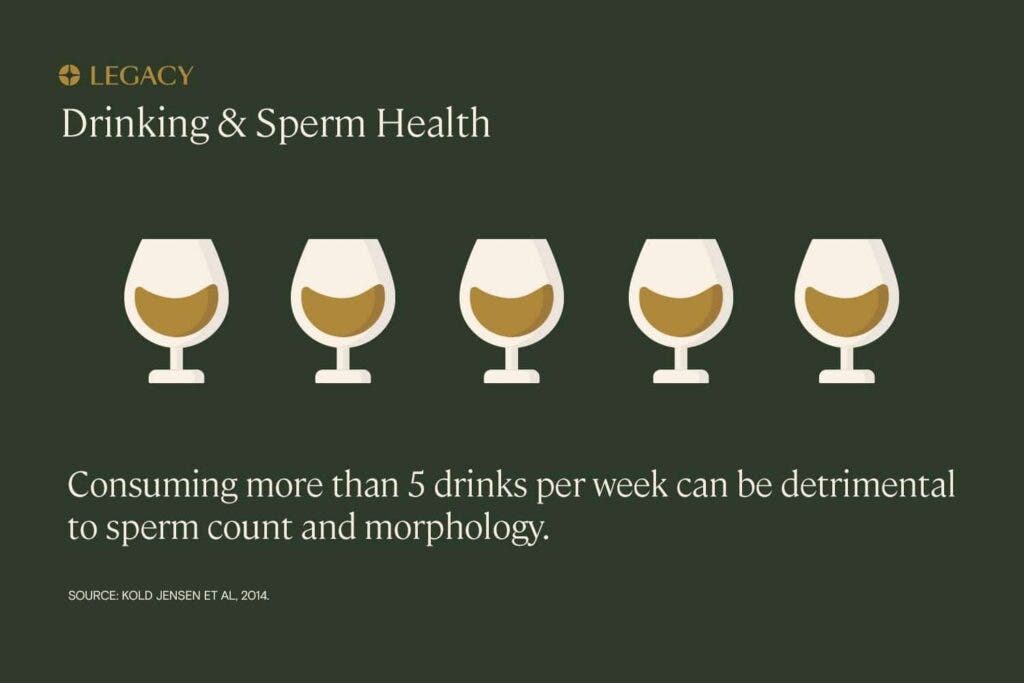There is a lot of focus on the person carrying the pregnancy when talking about alcohol and trying to conceive, but what about the male half of the question? Does alcohol affect sperm? Can it hinder your overall fertility?
Over the last 35 years, evidence suggests that male fertility has declined and sperm concentration has reduced.
If you and your partner are trying to conceive (TTC) or are embarking on fertility treatment, you may begin to think a bit more carefully about that beer you crack open at the end of the day. Let’s see what the research says.
Alcohol and male fertility
Does alcohol kill sperm? It’s not that dramatic. Having the occasional alcoholic drink is unlikely to significantly affect your fertility. But research does suggest that regular alcohol consumption may lower your semen parameters.
A few definitions that might be helpful when evaluating this research:
- Binge drinking is typically defined as having 5 or more drinks in a few hours.
- One drink, or one “unit,” is ⅓ of an ounce of alcohol, or the amount contained in:
- About 9 oz of beer
- About 3 oz of wine
- One shot (about 1 oz) of liquor
You’ll notice that typical serving sizes of hard drinks — 12–16 oz of beer, 4–6 oz wine, or a 2-oz shot glass — are more than one “unit” of alcohol.
Published in BMJ Open, a study by a research team in Denmark assessed 1,221 Danish men aged 18–28, looking at their weekly drinking habits and how often they binge drank. The participants also provided semen and blood samples so researchers could look at their sperm quality and reproductive hormones.
The men in the study drank an average of 11 units of alcohol per week. Researchers found that drinking alcohol in the preceding week was associated with changes in reproductive hormone levels: testosterone levels increased, and sex hormone-binding globulin (SHBG) decreased. The study stated that the reproductive hormone changes were more significant as the weekly alcohol units increased.
Regular drinking was also associated with lower sperm quality. Overall, the higher the number of weekly units consumed, the lower the sperm quality. This particular study noted that the negative effect on reproductive hormones and sperm quality was noticeable in men who drank five or more units a week, but most apparent in men who drank 25 or more units each week. That’s the equivalent of about 15 pints of beer.
Laboratory experiments conducted on rats have also shown alcohol to shrink their testicles. The research team hypothesized that this could also happen in humans.

Heavy alcohol use, alcoholism, and fertility
Many studies have looked at the effect of heavy alcohol use on fertility, concluding that excessive alcohol consumption has a detrimental impact on both the male reproductive hormones and semen quality.
The Danish study mentioned above also looked at men who consumed 40 units or more of alcohol per week. That’s about:
- 24–32 beers
- 15 mixed drinks
- 4–5 bottles of wine
In these men, sperm counts were approximately 33% lower than those who drank between 1 and 5 units per week. Sperm morphology (size and shape) was also altered in 51% of the heavy drinkers.
Habitual heavy drinking, like we might see in alcoholism, appears to have more wide-ranging impacts on fertility. While the Danish study above found that testosterone levels increased with increasing alcohol intake, other studies have shown that habitual, excessive alcohol consumption is associated with drastically reduced testosterone production.
The Danish researchers conclude that the altered hormone levels seen in male alcoholics suggests “habitual alcohol abuse may damage Leydig cells [cells in the testes that produce testosterone]” or disrupt the balance of male reproductive hormones.
The National Institutes of Health also advises that alcohol use is associated with low testosterone and altered levels of additional reproductive hormones. Heavy drinking can reduce sperm production by lowering testosterone, follicle-stimulating hormone, and luteinizing hormone, and raising estrogen levels.
Other ways that alcohol might affect sperm
Alongside the effects on hormone levels, sperm quality, and sperm quantity, alcohol can affect fertility in several other ways:
Erectile dysfunction
You may want to think about the effect of alcohol on your ability to have sex. The Sexual Medicine Society of North America advises that alcohol can cause erectile dysfunction (ED), or difficulty getting or maintaining an erection.
Alcohol can depress the central nervous system, motor skills and coordination suffer, and it can impact the signals between the brain and penis, causing ED. Although temporary, if you are drinking regularly and find it leads to ED, that could make TTC more difficult.
Dehydration
Alcohol causes you to urinate more frequently than usual (an effect known as “diuretic”), which can result in dehydration. When you become dehydrated, the volume of blood in the body and blood flow to the penis decreases — making it harder to get an erection. This could explain why alcohol sometimes causes erectile dysfunction.
Dehydration can also affect semen volume, or the amount of semen that you ejaculate.
Sugar
One problem with a lot of alcoholic beverages is the high sugar content. Comprehensive studies show a correlation between diets rich in sugar-sweetened drinks and impaired sperm motility (how well your sperm swims). Excess sugar can also lead to excess weight and obesity, both of which are associated with reduced sperm count and quality.
Learn more about sugar and male fertility.
Alcohol is known to disrupt circadian rhythms
Your body’s internal clock, known as its circadian rhythm, promotes quality sleep and overall health. Your circadian rhythm coordinates both your physical and mental systems, and helps to regulate all your major body processes: metabolism, immunity, energy levels, sleep cycles, cognitive function, and libido.
Alcohol has a negative effect on circadian rhythms, and can cause lower-quality sleep. Low libido, low energy levels, and sleep deprivation can all affect your ability to have sex and conceive.
Learn more about sleep and male fertility.

Learn more about how your lifestyle habits affect your sperm
Free webinar
July 23 at 5pm EST
Should you stop drinking if you’re trying to get your partner pregnant?
It’s not necessary to completely stop drinking alcohol if you’re trying to conceive. The same study, and others, have shown that abstaining from alcohol completely is also associated with lower sperm quality. The reason behind this is not well understood, but may be related to the antioxidants in alcohol.
The exact amount of alcohol intake that affects fertility is unclear, but fewer than five units of alcohol per week seems to be “safe.” That’s about 3–4 beers, 2–3 mixed drinks, or 3 glasses of wine.
If you regularly drink more than that, cutting down your alcohol intake may be beneficial to your sperm.
The good news is that, if you reduce your drinking, your sperm are likely to recover and reverse the adverse effects of alcohol on male fertility. The sperm cycle is around 74 days, so you should expect to see an improvement in any alcohol-related fertility concerns after about three months of drinking less.
If you are trying to lessen your weekly alcohol intake, here are a few tips.
Tips on how to drink less
- Go lower ABV. There are a lot of options for lower-alcohol drinks these days. Try switching your drink of choice to a low alcohol or even an alcohol-free version. Many bars and restaurants offer “mocktails” or “session beers,” so you can feel like you’re part of the party without the negative effects.
- Focus on the funds saved. Noting how much you spend on alcohol may give you quite a shock. If you set yourself a budget, it can seriously cut down the amount of alcohol you buy in a week, and you can use the money you’ve saved for a non-alcoholic reward.
- Go half and half. You can make that beer a shandy by adding lemonade, or wine a spritzer by adding soda — that will reduce the alcohol content but keep the taste. Or, you could alternate an alcoholic drink with a soft drink when you’re out or drinking with friends.
- Set your own pace. Don’t let others dictate how quick or how much you drink. Try to avoid getting pulled into rounds of drinks. You decide who fast and how much you want to drink.
- Plan activities that don’t center on drinking. If you find yourself reaching for alcohol through habit or boredom, try something different. Plan an evening of bowling, get outdoors for a walk, or hit the gym rather than heading down to a bar.



